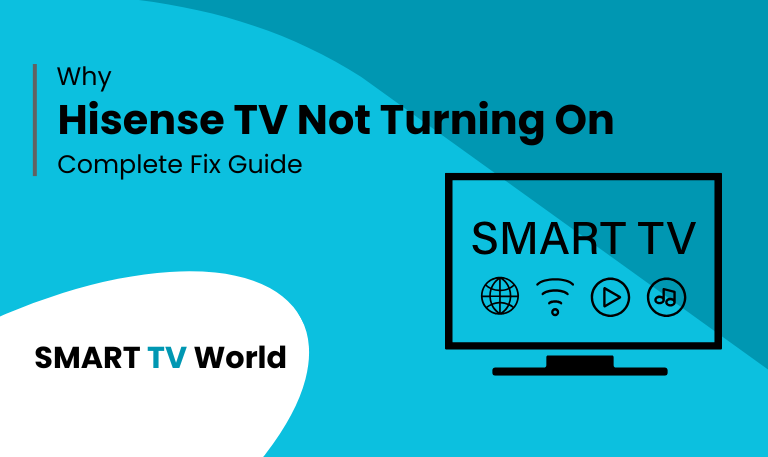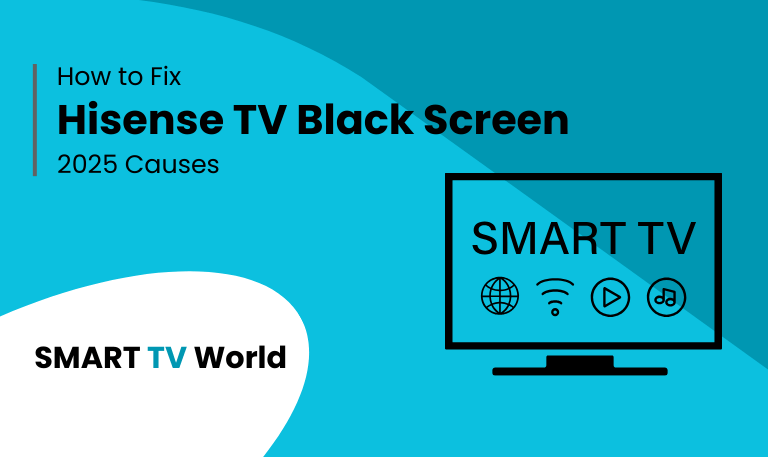There’s nothing more frustrating than sitting down to watch your favorite show or stream the big game only to find your Hisense TV not turning on. Whether it’s a blank black screen, no power indicator light, or the TV turns off immediately after starting, this is a very common issue faced by Hisense smart TV users.
But the good news? In most cases, this problem doesn’t mean your TV is dead. With the right troubleshooting steps, you can get it running again without calling a technician. This guide will take you through all the reasons why your Hisense TV won’t turn on and the exact fixes you need to try.
Why Is My Hisense TV Not Turning On?
Before jumping into solutions, it’s important to understand the possible causes. Some of the most common reasons include:
Faulty or loose power connection
Dead batteries in the remote control
TV stuck in standby mode
Power surge damage
Firmware glitches
Hardware failure (power board, backlight, mainboard)
By identifying the root cause, you can save time and fix your Hisense TV more efficiently.
Read Also: Soap2Day on Roku
Step 1: Check the Power Source
The simplest problem is often the most overlooked. If your Hisense TV is not turning on, start by inspecting the power source.
Make sure the power cable is securely plugged into both the wall socket and the back of the TV.
Test the outlet by plugging in another device such as a phone charger or lamp.
If you’re using a surge protector, try plugging the TV directly into the wall.
Faulty outlets and loose cables are responsible for a large number of TV power issues.
Step 2: Perform a Power Cycle
Sometimes your Hisense TV just needs a reset. This process clears out temporary glitches that may prevent it from booting.
How to power cycle your Hisense TV:
Unplug the TV from the power outlet.
Press and hold the power button on the TV for 30–60 seconds.
Wait at least one full minute.
Plug the TV back in and turn it on.
A power cycle can fix unresponsive TVs, frozen screens, and startup failures.
Step 3: Check the Remote Control
Your Hisense TV might be working fine, but the remote control may be the real culprit.
Replace the remote batteries with fresh ones.
Make sure nothing is blocking the IR sensor on the TV.
Try turning the TV on using the physical power button (usually located at the bottom or back of the TV).
If the remote still doesn’t work, download the Hisense RemoteNOW app on your smartphone as an alternative.
Step 4: Look at the Indicator Light
The status light on your Hisense TV gives important clues about its condition.
No light at all → TV may not be receiving power.
Red standby light but no response → TV stuck in standby mode.
Flashing light → Possible software or hardware issue.
Understanding the light signals can help you narrow down the issue quickly.
Step 5: Disconnect External Devices
Sometimes external devices such as gaming consoles, streaming sticks, or HDMI devices can cause boot issues.
Disconnect all HDMI and USB devices from the TV.
Try turning the TV on without anything connected.
If it works, reconnect devices one by one to identify the faulty one.
Step 6: Reset the Hisense TV
If your Hisense TV powers on but refuses to show a picture or stays frozen, a reset may be necessary.
Soft Reset (via Remote):
Hold the power button on your remote for about 10 seconds until the TV restarts.
Hard Reset (Button Reset):
Many Hisense TVs have a small reset pinhole button (often on the back).
Use a paperclip to press and hold it for 15 seconds.
Factory Reset (Menu Reset – only if TV turns on):
Go to Settings > System > Advanced Settings > Reset.
This will erase all custom settings but can fix stubborn software issues.
Step 7: Update the Firmware
Outdated firmware can cause startup and power problems. If your TV turns on but behaves strangely, updating the software is a smart move.
Go to Settings > System Update > Check for Updates.
If available, install the latest firmware.
Firmware updates often fix bugs, improve performance, and prevent future problems.
Read Also: Samsung TV Power Button
Step 8: Test With a Different Power Cable
Hisense TVs use detachable power cables. If your TV isn’t turning on, try using a compatible replacement cable. Sometimes the issue is as simple as a worn-out cord.
Step 9: Inspect the Power Board (Advanced Users)
If none of the above works, the problem could be with the internal power board. Signs of a faulty board include:
Burning smell inside the TV
Clicking sound when attempting to power on
No indicator light despite a working outlet
At this stage, it’s recommended to contact a technician. Replacing a power board or capacitor requires professional expertise.
Step 10: Contact Hisense Support
If your Hisense TV still won’t turn on after all troubleshooting, it’s time to reach out for official support.
Check your warranty status. Hisense often provides free repairs for TVs under warranty.
Visit the Hisense support website and enter your model number.
Call their customer service for repair or replacement options.
Preventing Future Power Issues
To avoid running into this problem again, keep these tips in mind:
Use a surge protector to prevent damage from power spikes.
Keep your TV firmware updated regularly.
Avoid overheating by ensuring proper ventilation.
Disconnect unused devices that may cause HDMI conflicts.
Hisense TV Not Turning On FAQs
Q: Why won’t my Hisense TV turn on but the red light is on?
A: This usually means your TV is stuck in standby mode. Try a power cycle or holding the power button for 10 seconds to force a restart.
Q: My Hisense TV has no power light at all. What should I do?
A: First, confirm the outlet works with another device. If the outlet is fine, the issue may be with the power cable or internal power board.
Q: Can a bad HDMI device stop my Hisense TV from turning on?
A: Yes, sometimes faulty HDMI or USB devices can prevent your TV from booting. Disconnect all accessories and try powering on again.
Q: How do I reset my Hisense TV without a remote?
A: Use the physical reset button (often a pinhole at the back). Hold it for 15 seconds until the TV restarts.
Q: Why does my Hisense TV turn on then immediately turn off?
A: This may be caused by overheating, a faulty power board, or firmware glitches. Perform a power cycle first, then update the firmware if possible.
Q: Will a firmware update fix the Hisense TV black screen issue?
A: Yes, many users report that updating the software fixes boot issues and black screen problems. Always keep your firmware up to date.
Q: How do I know if my Hisense TV power board is bad?
A:Common signs include no indicator light, strange clicking sounds, or a burnt smell. If this happens, a technician may need to replace the power board.
Q: Can I use the Hisense RemoteNOW app if my TV won’t turn on?
A: Unfortunately, no. The app only works when the TV is already connected to Wi-Fi. If your TV won’t power on at all, use the physical buttons instead.
Q: Why does my Hisense Roku TV not turn on but only blinks?
A: Blinking lights usually indicate a software problem. Try unplugging the TV for one minute, then hold the power button while plugging it back in.
Q: Should I repair or replace my Hisense TV if it won’t turn on?
A: If your TV is still under warranty, definitely go for a repair. If the TV is older and the repair cost is high, replacing it may be a better long-term option.
Conclusion

A Hisense TV not turning on can be incredibly frustrating, but in most cases, the fix is simple. From checking the power source and remote control to performing a full reset, these steps will help you bring your TV back to life. If the problem persists even after trying all the solutions, it may be a deeper hardware fault requiring professional repair.
Pillar Post:


![Hisense TV Warranty Check | How to Verify [2025 Easy Guide] 7 Hisense TV Warranty Check How to Verify [2025 Easy Guide]](https://smarttvworld.com/wp-content/uploads/2025/08/Hisense-TV-Warranty-Check-How-to-Verify-2025-Easy-Guide.png)